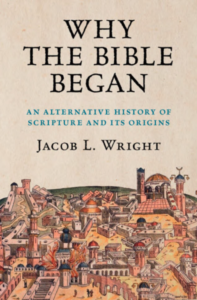Rabbi David Geffen, who earned his BA at Emory in 1965, is a frequent contributor to various newspapers, among them the Atlanta Jewish Times and the Jerusalem Post. He remains in close connection with the university and is a supporter of the Libraries. The Rose Library has his papers – see the finding aid of the Louis and Anna Geffen Family Papers.
National Library Launches a Bookmobile

The National Library of Israel’s bookmobile.
(photo credit: Uri Bareket/The National Library of Israel)
Geffen’s current contribution to the Jerusalem Report* touches on a library-related topic. It calls attention to the bookmobile, a recent initiative of the National Library of Israel (NLI), which moved to a new building that opened its doors to the public on October 29, 2023. (The original date of the opening was postponed because of the terrorist attack on October 7, 2023, and the concomitant war. In response, NLI also launched several programs, a selection of which is described here.) The bookmobile is part of the NLI educational program that also serves pupils evacuated from their homes because of the war. As Rabbi Geffen quotes Tsila Hayun, head of Education and Culture at the National Library of Israel, the activities the NLI team offers encourage schoolchildren to become invested readers and helps them learn how to navigate the catalog and understand the diverse ways in which they can choose their next reading. On the same pages, Rabbi Geffen also shares his own experiences visiting and using NLI and the many unique and enchanting programs and collections it houses.
In the same issue of the Jerusalem Report, Tibor Krausz reviews Professor of the Hebrew Bible at the Candler School of Theology Jacob Wright’s most recent book Why the Bible Began: An Alternative History of Scripture and Its Origins. The book was highly anticipated and reviewed ahead of its publication in the United States on October 19, 2023 (see Adam Gopnik’s review in The New Yorker). Since its publication, it earned several accolades, including Publisher Weekly’s Best Book of 2023 in Religion and The New Yorker’s list of Best Books of 2023. Recently, Jacob Wright was also recognized for his work as an educator: he is the 2024 recipient of a Diamond Award for Excellence in Education. As an avid reader of his book, the author of this blog must note that the universally accessible prose and didactic structuring of the book betrays the author’s pedagogic vein and sensitive understanding of the varying needs of his many readers. Krausz is likewise enthusiastic about Wright’s book, heavily citing it to conclude that it “is secular scholarship at its best, as it methodically illuminates the possible motives of creative authors in composing a body of work that has stood the test of time and remains as relevant as ever for billions of people: Jews, Christians, and Muslims” (Krausz 45). Indeed, Why the Bible Began stresses that whereas the Jewish literary creativity in the ancient world was unparalleled, if closely read, it can offer universal lessons to generations to come.
*Faculty, students, and staff with an active Emory ID can access the Jerusalem Report e-journal.
—Katalin Rac, Jewish Studies librarian

